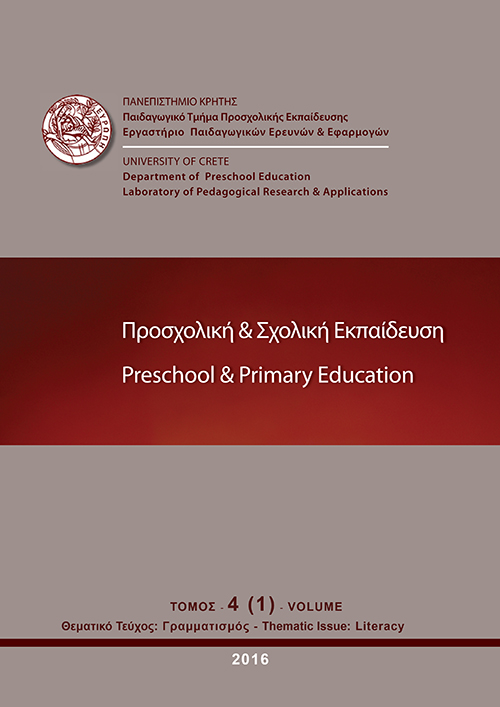Educational policy about literacy in the first Venizelos' government as part of the broader evolutionary political orientations
Abstract
The present paper examines the legislative proposals included in the educational draft laws of 1913. The proposals were associated with proposed political modernization, highlighting structured theoretical democratic discourse. The proposed legislative changes in primary and secondary education related critical literacy with the effective integration of male and female citizens into the system in the context of changing and differentiated political and social conditions. The political content of the educational draft laws was emphasized and was related to the overall political views of E. Venizelos’ first government. The political discourse of that period also included novel attitudes about the state’s effective organization and welfare policies for citizens. Moreover, an internationalized narrative about the policy of rights had already been established. Education was part of the welfare policy, as an attempt was made to educate and train citizens so that they had more opportunities to enter the labor market. At the same time, a request to restore all fields of the economy was highlighted, while the citizens’ education became a necessity. More specifically, utilizing human resources was based on the investment in human capital. Reference was made to a structural and operational correlation between education and the economy. In this respect, education should effectively contribute to economic development. Different objectives tied to primary and secondary education organization were defined by critical literacy. This way, the conditions of restructuring political practice were formed and orientated towards the participation of citizens in the operations of a civil society and political monitoring.
Underprivileged citizens, that is, those of lower strata and capital, were taken into account in social and strata terms. The draft laws were conducive to legalizing a version of political democratic narrative which forms the basis of conceptualizing social and political peculiarities within a more general transition policy to an industrial society. Their integration and adjustment systems are rather complicated. The issue of critical literacy in the 1913 draft laws was connected to democratization and the removal of political dysfunction in order to reinforce democratic pluralistic institutions. The issue of democratic modernization, democratic structure and the necessity for economic reconstruction created a different political discourse about the dynamics of systems, education included. Critical literacy is studied in correlation to the historic peculiarity which formed a different paradigm of functional education. The preamble, as textual discourse, is studied in comparison with the proposed educational reform, so as to highlight the intentions of the individuals involved in forming educational policy on critical literacy as well as their normative expectations. Although the 1913 draft laws were not passed, their structural interpretative approach serves for a subtle analysis of political objectives within a proposal for a different type of literacy.
Article Details
- How to Cite
-
Kalerante, E., Eleftherakis, T., & Galanis, K. (2016). Educational policy about literacy in the first Venizelos’ government as part of the broader evolutionary political orientations. Preschool and Primary Education, 4(1), 226–238. https://doi.org/10.12681/ppej.10080
- Section
- Articles

This work is licensed under a Creative Commons Attribution-NonCommercial-ShareAlike 4.0 International License.
Authors who publish with this journal agree to the following terms:
- Authors retain copyright and grant the journal right of first publication with the work simultaneously licensed under a Creative Commons Attribution Non-Commercial License that allows others to share the work with an acknowledgement of the work's authorship and initial publication in this journal.
- Authors are able to enter into separate, additional contractual arrangements for the non-exclusive distribution of the journal's published version of the work (e.g. post it to an institutional repository or publish it in a book), with an acknowledgement of its initial publication in this journal.
- Authors are permitted and encouraged to post their work online (preferably in institutional repositories or on their website) prior to and during the submission process, as it can lead to productive exchanges, as well as earlier and greater citation of published work (See The Effect of Open Access).



